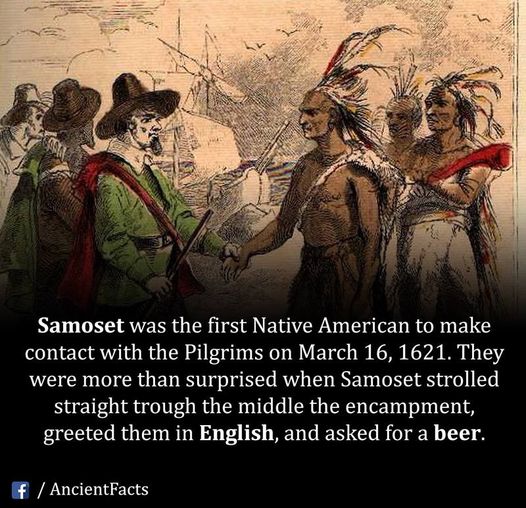
Samoset was a remarkable figure in early American history, known for being one of the first Native Americans to make contact with the Pilgrims at Plymouth Colony in present-day Massachusetts. His interaction with the settlers in 1621 is a notable example of early cooperation between Native Americans and European colonists.
Samoset was a sagamore (subordinate chief) of the Abenaki tribe, hailing from what is today Maine. His first encounter with the Pilgrims was unexpected and surprising to both parties. He walked into Plymouth Colony on March 16, 1621, greeting the settlers in English, which he had learned from fishermen and traders along the Maine coast. His greeting was reportedly, “Welcome, Englishmen! My name is Samoset.”
His knowledge of English was a boon for the Pilgrims, who had been struggling to survive through their first harsh winter in the New World. Samoset’s initial visit was brief, but he returned a few days later with Squanto, a member of the Patuxet tribe who spoke even better English due to having been kidnapped by an English sea captain, taken to England, and later returned to America.
Samoset and Squanto became instrumental in helping the Pilgrims establish a relationship with Massasoit, the leader of the Wampanoag Confederacy. This relationship was crucial for the survival of the settlers, as Massasoit’s people provided the Pilgrims with vital information on local resources, agricultural techniques, and the political landscape.
Samoset continued to play a role in the interaction between the Native Americans and the Pilgrims. He was part of the negotiations for the Treaty of Plymouth, which established peace between the settlers and the Wampanoag. This treaty, brokered in part by Samoset and Squanto, is significant because it resulted in a period of peace between the Pilgrims and the tribe that lasted over 50 years.
Samoset’s role in these early encounters is a testament to his diplomacy and his willingness to bridge the cultural gap between Native Americans and European settlers. His initial friendly approach and subsequent efforts helped lay the groundwork for cooperation that was crucial for the survival and eventual success of the Plymouth Colony.
After the pivotal first interactions with the Pilgrims, Samoset continued to engage in significant ways with the early settlers. His ongoing involvement helped to maintain the fragile peace between the Pilgrims and the Native American tribes of the region. Though less documented than his initial encounter, Samoset’s subsequent dealings with the colonists suggest that he remained a figure of influence and diplomacy.
Samoset’s further contributions included facilitating communications and negotiations between various tribal leaders and the Pilgrims. His ability to speak English made him a valuable intermediary during these early and often tense interactions. He was known for his honesty and straightforwardness, which earned him respect from both Native Americans and settlers.
In addition to his diplomatic endeavors, Samoset shared crucial survival tips with the Pilgrims, including local fishing techniques and the best ways to cultivate corn—an essential crop that would become a staple for the settlers. His guidance in these areas was vital, considering the Pilgrims’ initial unfamiliarity with the new environment and its resources.
Interestingly, Samoset was also involved in some land transactions, which were somewhat controversial. In 1625, he claimed to have authority over a piece of land in present-day Maine and sold it to a group of settlers from Plymouth Colony. This act was quite unusual and demonstrates his unique position as a Native American who engaged directly with English practices and legal concepts.
His interactions were not limited to the Pilgrims of Plymouth; he also had dealings with other English settlements that were springing up in New England. Samoset’s role as an intermediary and facilitator among various groups extended beyond Plymouth, helping to shape the early colonial landscape of New England.
You may also like: Why Join a Lineage Society?
Samoset’s legacy is a complex one, reflecting the broader story of Native American interactions with European settlers. While he is celebrated for his role in fostering peace and mutual understanding, the broader consequences of European colonization for Native American peoples were devastating. Nonetheless, Samoset remains a significant historical figure for his early and proactive engagement with the new settlers, which undoubtedly shaped the course of American history during a critical period of initial contact and settlement.


